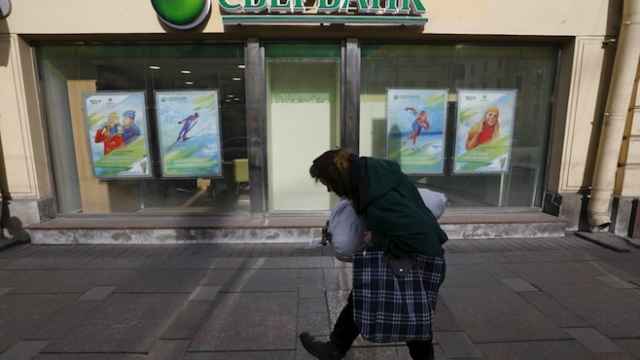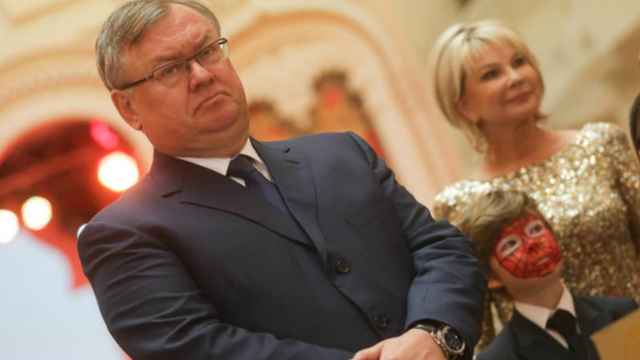Russian state companies and banks are cutting staff and scrapping projects as they prepare for another surge of foreign debt repayments of at least $35 billion before the end of the year amid falling energy export revenues and a weaker ruble.
Sberbank, the country's top bank, has already shed 3,600 jobs this year and is promising to unveil a "management reform" by October expected to include further job cuts. Another big state bank, VTB has laid off 2,000 workers and promised more cuts.
Gas giant Gazprom scrapped a $10 billion gas liquefaction plant in the Pacific. Top oil firm Rosneft had to postpone some refinery modernisation projects which had been due to cost up to $15 billion over five years, according to Russian officials.
"We have taken a decision to adjust our business plans to take into account the macro environment and optimise capital expenditures to prioritise upstream projects," said Rosneft, whose total debt is estimated at over $40 billion.
Russia has a very small sovereign debt of around $50 billion, but the world's largest energy exporter has amassed more than $500 billion in corporate debt over the past decade as its state energy firms and banks borrowed heavily to grow at home and abroad.
Sanctions imposed on Russia over the annexation of Crimea and incursion in Ukraine since last year have made Western borrowing virtually impossible for most Russian companies, preventing them from refinancing debts as they did during the last fall in oil prices in 2008-2009.
Rating agencies and Russian fiscal authorities expect debt repayments in July-September to go smoothly, in a repeat of developments in the fourth quarter of 2014 and the first quarter of 2015 when some $36 billion was paid back.
Question of Survival
Russia's central bank issued a statement on Monday designed to play down fears that large repayments could put the ruble under further pressure as the currency hovered near a five-month low, having hit an all-time low in December.
Companies buying up hard currency for debt repayments helped drive the ruble sharply lower last year.
The central bank said it thought real debt repayments until the end of the year would be much smaller than its own initial estimates of $61 billion, as much of that sum was represented by companies lending to their own subsidiaries which can be rolled over.
The central bank said its latest estimates showed that real redemptions could amount to $35 billion until December.
"Thus, the Bank of Russia does not expect excess demand in the FX market in the run-up to external debt repayments. The Bank of Russia does not forecast considerable portfolio investment outflow and higher tensions in the FX market due to foreign currency purchases for import contract payments," it said.
The central bank has said it believed Russian companies had enough liquidity to service their debt and a potential liquidity shortage should not exceed $4 billion, which could be covered from a special central bank cushion of $14 billion.
Ratings agency Moody's said it believed Russian oil firms will largely shrug off low oil prices due to a favourable tax regime and a weaker ruble.
A Gazprom official told Reuters the company, whose debt stands at around $25 billion, has enough export revenues for debt servicing and has no plans to buy hard currency from the market in the next months. The company has to redeem at least $1.7 billion before the year end, according to Reuters data.
Banks have no such luxury as they have much smaller hard currency revenues and will have to shrink faster.
"Today our clients have less money and there is no bank which can afford to refrain from cutting costs or raising efficiency in an environment of depressed revenue growth and rising costs of risk," said Alexey Marey, managing director from one of the biggest Russian private banks, Alfa Bank.
"For some banks it is a question of survival, for others — it is a question of choosing priorities in cost cutting and development," he added.
A Message from The Moscow Times:
Dear readers,
We are facing unprecedented challenges. Russia's Prosecutor General's Office has designated The Moscow Times as an "undesirable" organization, criminalizing our work and putting our staff at risk of prosecution. This follows our earlier unjust labeling as a "foreign agent."
These actions are direct attempts to silence independent journalism in Russia. The authorities claim our work "discredits the decisions of the Russian leadership." We see things differently: we strive to provide accurate, unbiased reporting on Russia.
We, the journalists of The Moscow Times, refuse to be silenced. But to continue our work, we need your help.
Your support, no matter how small, makes a world of difference. If you can, please support us monthly starting from just $2. It's quick to set up, and every contribution makes a significant impact.
By supporting The Moscow Times, you're defending open, independent journalism in the face of repression. Thank you for standing with us.
Remind me later.





